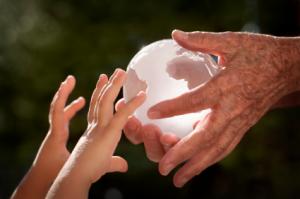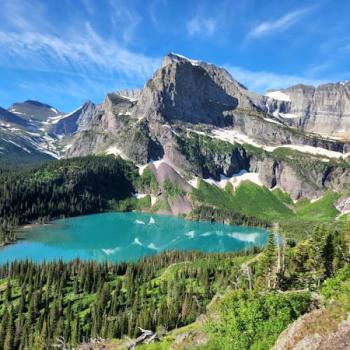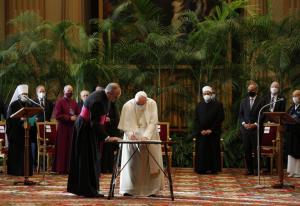
What legacy, what kind of world, are we leaving for our children, grandchildren, and great grandchildren? I have asked myself that question often. It’s a good question that global warming, perhaps prime among a number of issues, raises disturbingly, But I’ve only been thinking three generations ahead. An Indian chief says that’s not good enough.
I was listening to Minnesota Public Radio’s Fly Over” series, recording voices at various stops on a trip down the Mississippi River. The final episode, “Voices from the Bayou,” featured local residents including Chief Shirell Parfait Dardar of the Grand Caillou/Dula Band of the Biloxi-Chitimacha-Choctaw. She doubled or tripled down on my question. For her and her community the question was:
What kind of world are we leaving for the next seven generations?
At that I sat up and paid attention. A second time I heard the same theme. Back in Minnesota, at the other end of the Mississippi River, a guide at the Mille Lacs Lake Indian Museum was talking. She also said seven generations is how far Ojibwe people feel their responsibility for the future goes.
Could this native sensitivity to the needs of seven generations to come speak to a world facing such pressing dangers as: global warming, migration, nuclear Armageddon, evolving pathogens, species extinction, terrorism, the widening gap between rich and poor, the loss of a sense of belonging to place and community? That’s just to mention a few of the dangers that we can see. What else might land on us unexpectedly?
Legacies
I have received a small financial legacy from my parents, and I hope to be able to offer the same for the generation to follow me. I hope I can have some positive influence on the generation (maybe two generations) after that. But there’s another legacy accruing, a legacy of a despoiled earth and fragmented communities that threatens to last a lot longer.
Of course, we are responsible for unlimited generations to come, not just seven. But it’s hard to feel that way, and feelings are our motivators. The question Chief Dardar raises for me is, How far do feelings go? If they can extend seven generations out, maybe that’s enough to encourage a lifestyle that’s truly sustainable longterm.
Seven generations?
People don’t live to see the seventh generation. So what’s special about the number seven and the seven generations to follow us?
I tried looking in the other direction. Many people, of whom I wish I was one, know the names of ancestors seven generations before them. That would be about 200 years. Some can go back farther than that. But 200 is an interesting number of years, just as seven is an interesting, symbolic number in many cultures. A psychologist of religion – I believe it was Peter Berger – said that 200 years is about as long as stories can be retained in communal memory.
I like being able to feel proud of my ancestry. They showed great courage by pulling up stakes in the Old Countries (in my case Germany and Holland) and beginning life anew a strange new world. I like the story of the faithfulness my grandfather, Carl Heitl, showed. He went to work at an early age when his father died, giving up a promotion because to do so he would have had to violate a teaching of his church. I grieve over the story of an uncle, Joe Heitl, who loved tossing a football around with the younger kids on the block and had a promising future in high school and maybe college football but died in a car accident. I treasure the story anyway.
And there’s my wife’s great uncle who died rescuing people caught in a storm on Mille Lacs Lake. A monument on the shore of that lake memorializes William A. Tauer. Even if these people died before I was born, their memory lives in me and others of their descendants.
The legacy of my generation
Now when I turn back to the future, I realize that there will be people seven generations from now will know stories about, if not me personally, then at least my generation. It will be the kind of knowledge that can’t be had from history books. When I read about medieval kings and Japanese Samurai, I don’t actually feel much. I don’t either bless or curse people I get to know from a book, but I do bless ancestors whose stories I’ve heard. I can imagine being blessed or cursed by descendants in generations to come. That gives me pause.
People of this generation, my peers in the richest countries, have lived wastefully and destructively on earth. We are beginning to realize that fact. In the final analysis, what kind of legacy will be ours? Will people up to seven generations in the future bless or curse us? Would it help if we adopted this native way of thinking about the future:
You are responsible to the next seven generations!
Image credit: Google Images











